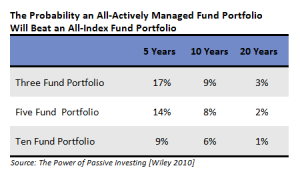 Index funds have, arguably, been touted as the best investment for the average investor. They have consistently outperformed the majority of the actively managed mutual funds. Over the long term broad stock market index funds have averaged an annual return of about 8%. Unfortunately many investors have taken these points to assume an index fund is a safer investment. Which is far from the truth.
Index funds have, arguably, been touted as the best investment for the average investor. They have consistently outperformed the majority of the actively managed mutual funds. Over the long term broad stock market index funds have averaged an annual return of about 8%. Unfortunately many investors have taken these points to assume an index fund is a safer investment. Which is far from the truth.
You’ve most likely come across index funds as an option in a retirement plan, at a fund company’s website or seen them offered through your online broker. Almost every fund family offers several different index funds. But not all index funds are equal.
What Is An Index?
An index is a group of stocks used to represent a portion of the stock market. If you’ve heard of the Dow, Nasdaq, S&P 500, Russel 2000, or Wilshire 5000 you’ve heard of an index. Which are all used to measure a portion of the markets performance.
The most well known index, the Dow is an index of 30 large companies that are believed to mimic the overall market. The S&P 500, however, is an index of 500 companies that offers a representation of the overall markets performance.
The majority of index funds are based on the S&P 500 or the Wilshire 5000 (all the U.S. publicly traded companies). Other index funds follow the treasury bond index, commodities index, futures index, as well as many foreign indices.
Why Invest In Index Funds?
There are three big reasons for choosing an index fund over mutual funds or stocks.
- Instant diversification
- Many mutual funds don’t beat the S&P 500
- Cost savings
Much like a mutual fund, you get immediate diversification when you invest in an index fund that mimics the S&P 500 for example. This doesn’t remove all the risk of investing in the stock market but it does provide more safety than investing in a single stock.
Beating the stock market is not an easy thing for a mutual fund. Having to do it every year can be even more difficult given the rules and regulations that mutual funds have to follow. Because of this almost 80% of the mutual funds don’t beat the market every year. Some of this has to do with the type of investments a mutual fund is limited too, as described in its prospectus. The rest can be blamed on the fund managers.
Every mutual fund and index fund has fees measured by the expense ratio. The lower the expense ratio the better. Most index funds have lower expense ratios than the average mutual fund. Those lower fees keep more of your money invested in the fund and out of the fund companies hands. It may only be a fraction of a percent difference but it’s still a savings that adds up. The reason? Since an index fund, an S&P 500 index for example, only invests in the stocks in that index. It doesn’t take a genius to run an index and invest in those 500 stocks. It should remove the costly stock picking managers and staff from the equation.
Which Index Funds Are The Best?
The best index funds have the lowest fees. The easiest way to find this out is a quick search with your online broker or in the prospectus. Once those have been identified, you should ask which type of index fund, if any, is a good investment for you?
If an index fund fits into your investment strategy. The only index funds to put your money into should have the lowest expense ratio. All S&P 500 index funds, for example, should have a similar return each year. There is no reason to pay an expense ratio of 0.50% if there is another fund with a ratio at 0.10%. The fund charges you the expense ratio on your total investment every year. Whether it makes you money or not. It just makes sense to get the lowest cost investment possible if the annual returns are similar.
No fund is a “set it, and forget it” investment, but an index fund comes the closest to that description. If it fits into a long term investment strategy. Once an index fund becomes a short to mid term investment, I could argue it becomes much riskier. If mutual funds are your investment of choice, index funds offer a great low cost alternative.
